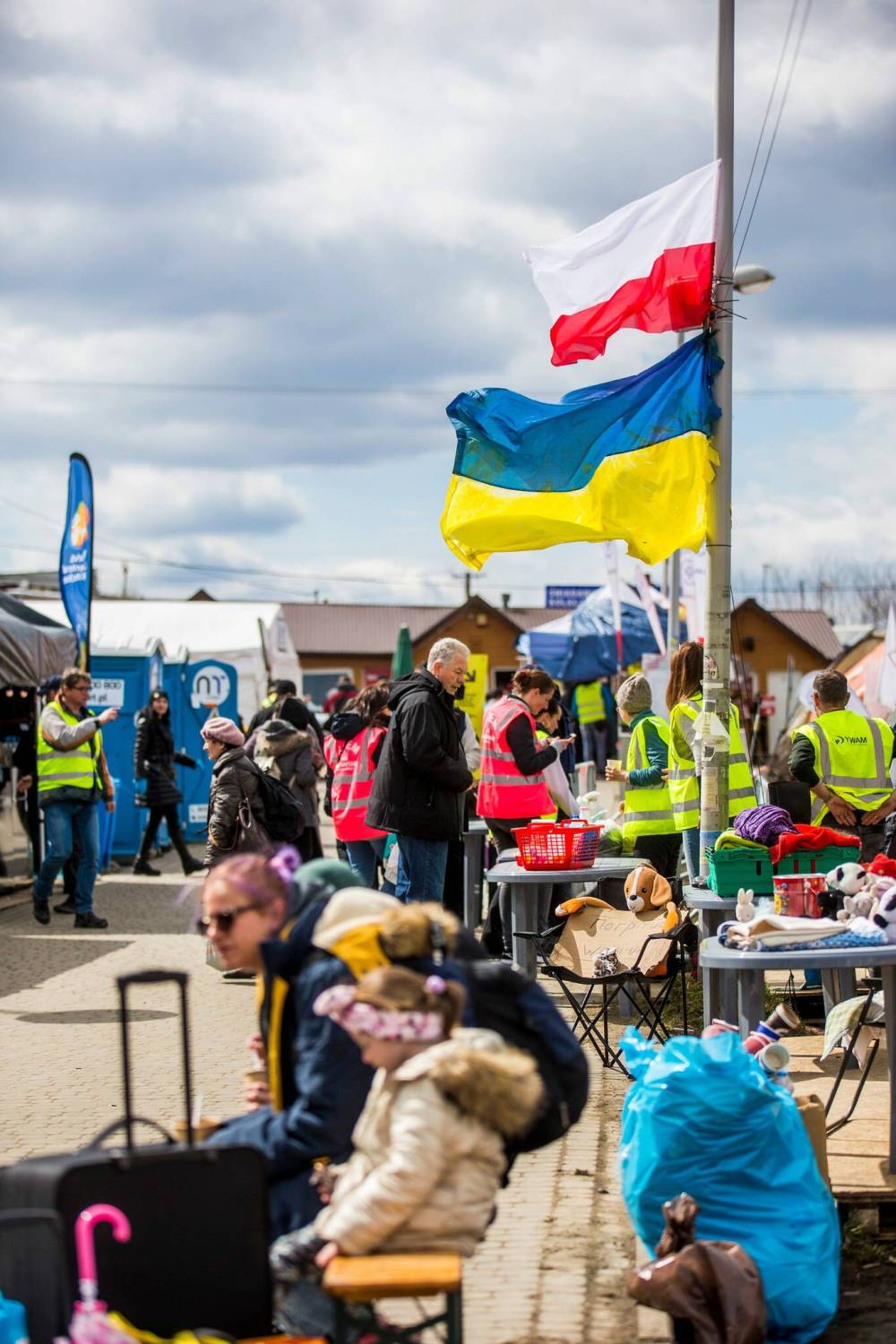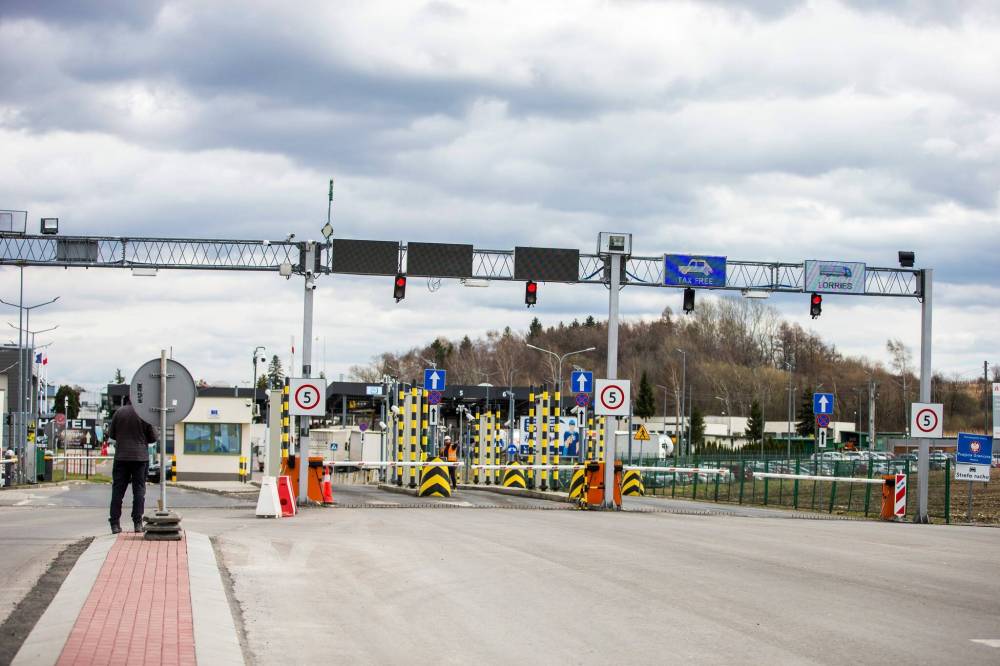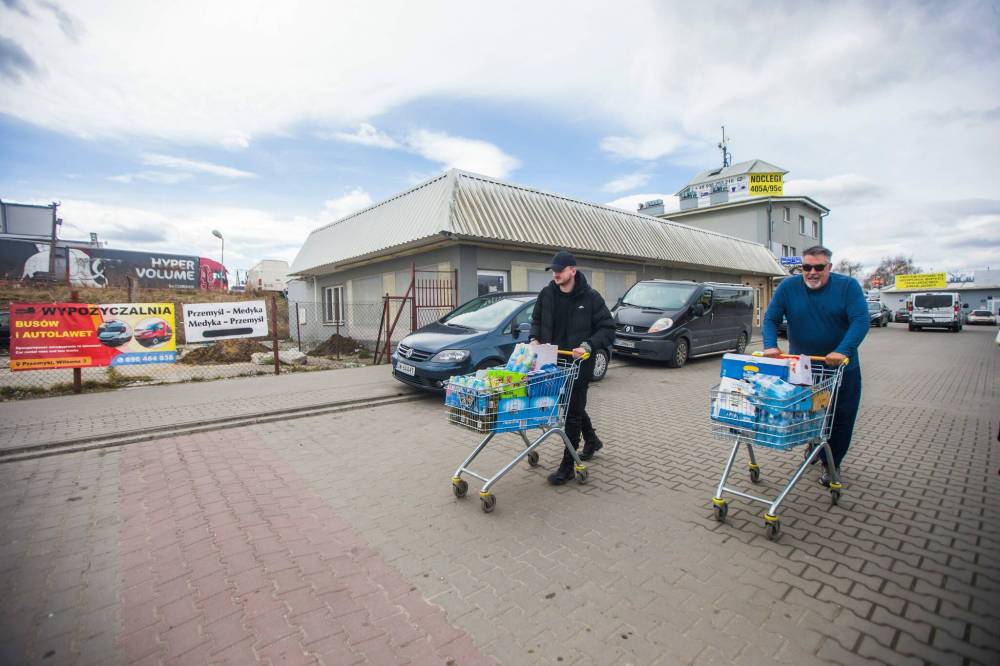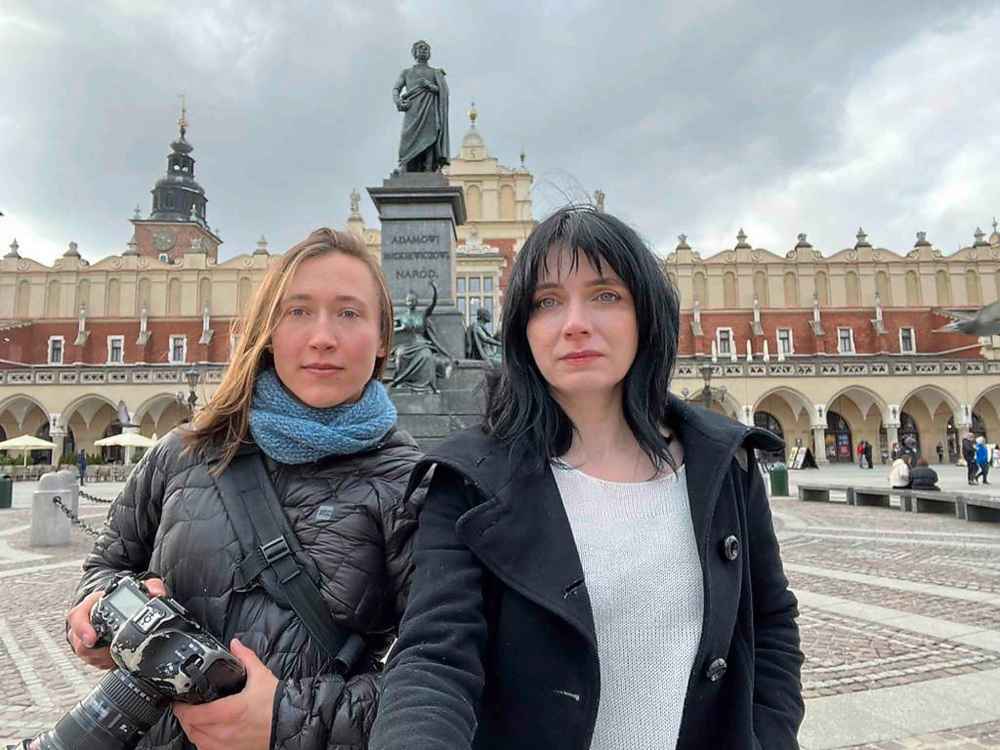On the border with hell
On one side, a war-torn nation; on the other, a cheerful, bustling community of volunteers ready to help refugees
Advertisement
Read this article for free:
or
Already have an account? Log in here »
To continue reading, please subscribe:
Monthly Digital Subscription
$0 for the first 4 weeks*
- Enjoy unlimited reading on winnipegfreepress.com
- Read the E-Edition, our digital replica newspaper
- Access News Break, our award-winning app
- Play interactive puzzles
*No charge for 4 weeks then price increases to the regular rate of $19.00 plus GST every four weeks. Offer available to new and qualified returning subscribers only. Cancel any time.
Monthly Digital Subscription
$4.75/week*
- Enjoy unlimited reading on winnipegfreepress.com
- Read the E-Edition, our digital replica newspaper
- Access News Break, our award-winning app
- Play interactive puzzles
*Billed as $19 plus GST every four weeks. Cancel any time.
To continue reading, please subscribe:
Add Free Press access to your Brandon Sun subscription for only an additional
$1 for the first 4 weeks*
*Your next subscription payment will increase by $1.00 and you will be charged $16.99 plus GST for four weeks. After four weeks, your payment will increase to $23.99 plus GST every four weeks.
Read unlimited articles for free today:
or
Already have an account? Log in here »
Hey there, time traveller!
This article was published 11/04/2022 (1338 days ago), so information in it may no longer be current.
MEDYKA, Poland — The shopping cart rattles as Art Ballard pushes it through a squashed parking lot, past a warren of small shops advertising meat and candy. Past the spot where buses pause every few minutes to pick up or drop off dozens of riders, who arrive dragging suitcases stuffed with everything they’d taken with them, when they first fled Ukraine.
“You want to see the border?” he says. “Come with us. That’s where we’re going.”
By now, the flood of human beings that swept through this spot in the first weeks of the war has slowed. On a narrow brick vein that winds the last 200 metres to the border, lined by a patchwork of aid tents thrown up by a dizzying number of non-governmental organizations, nearly as many people are now walking east, into Ukraine, as west into Poland.

Still, the foot path is bustling. Volunteers in yellow vests mill about in front of tents, offering everything from French fries to fruit. There is a tent handing out dog food and animal carriers; a tent run by a small Scottish charity, dishing out soup; tents where refugees can pick up bars of soap, charge their phones, or try on any of a few dozen winter coats.
Each such tent bears a sign, in Ukrainian, explaining that its goods are bezkoshtovno — they’re free.
Ballard threads the rickety shopping cart through this tangle of people at a steady, plodding pace. The cart is piled with an eclectic mix of items: juice boxes, jarred olives, bottles of water. He’ll walk it through customs and drop it on the Ukrainian side of the border; someone there will drive it 80 km to Lviv, where warehouses fill up with the world’s donated aid.
Ballard has been here for only a couple of days. A bear-sized and jovial man from Sacramento, he raised a bundle of cash at home, flew to Poland, rented a camper van and, like most foreign volunteers who come here to help, showed up in Medyka, this once-sleepy village tucked in rolling green hills that is now right on the doorstep of the war.
We came looking for Canadians who’d also come here to help out, we tell Ballard. How would we find them?
“Just do what we did,” he says, with a hearty chuckle. “Show up and start talking to people.”
Canadians are here, but elusive. One man tells us he’s met five or six in the volunteer camp, but it’s hard to pin them down. We get contacts, but they can’t talk, either because they’re going to Ukraine, or exhausted and coming out; or because they just didn’t show up for their shift that morning and nobody knows where they are or, come to think of it, their name.
“Isn’t that John?” one aid worker at a cafeteria tent muses to his manager. “The Canadian?”
His supervisor fixes him with a tired look. “We have a dozen Johns here.”
You hear things like that often as you near the border. The war has drawn a throng of colourful characters here, hoping they can do some good; if they’re being honest, some are here for the adventure. Young men tack a few days of volunteering onto their European vacations; an Alaskan man in his 50s took a couple of weeks off work and flew on a whim to Poland.

The effect of all these characters, all these small-scale aid efforts merging together, is that the atmosphere near the border feels a little like a festival. A charitable one, driven by good intentions, but running now on its own momentum. In fact, as several aid workers tell us, on some days there are more volunteers and journalists than refugees who need help.
That hasn’t come without problems. A short drive from the border, the postcard-pretty city of Przemyśl — it’s pronounced “Shemish” — has been deluged by volunteers and aid workers of all descriptions. Lodging is hard to find; what few rooms remain are expensive, even by Canadian standards; some refugees are forced to sleep at the overcrowded train station.
What is it about this moment, this crisis, that has drawn so many to make themselves physically present to help?
The answer can be found, in pieces, at a grimy bar in Krakow’s old quarter. It’s a frowzy and friendly place, with a dart board hung perilously close to the door and water all over the floor of the closet that serves as its lone toilet stall. Old wooden walls are slathered with stickers of punk bands that have played there, in a smoky basement down a steep flight of stairs.
It’s late on a Friday night. The place is brimming with a motley crew of people: weathered Polish men quaff pints of beer at the sticky bar, while university students flirt at back tables. There are no masks to be seen: despite having one of the lowest vaccination rates in Europe, Poland appears to have largely stopped caring about mitigating the spread of COVID-19.
The bar is already packed when a group of leather-clad English motorcycle enthusiasts spill in.
They’d just come back from the border at Medyka, where they’d driven 23 hours from Wolverhampton without stopping for anything except gas and coffee. There, they’d unloaded vans crammed with humanitarian goods: tampons and bottled water and diapers or, as they call ‘em, “nappies.” The eldest in the group, and also the one who did the most driving, is 72.
One of them sits down at a table occupied by its own ragtag group. There are two reporters from Canada and one from Peru; a New Zealand man who had travelled to Kyiv as a tourist in January and, when war broke out, flew back and bought an old car to haul people and aid across the border; and a nebbish military veteran from Ohio who is doing the same.
The biker’s nickname, embroidered on a patch and worn on the right side of his chest, is Shitbreaks, which refers either to the fact he rides an older Harley, which aren’t known for their good brakes, or the frequency with which he once needed to stop to use the bathroom on one club tour. Whichever story you prefer.
He nods at his friends, who are laughing as they mingle with Polish and Austrian and American visitors. They’re exhausted from the journey, and still processing what they witnessed at the border: “I’ve never gone through so many emotions in one day in my life,” he says, raising his voice to be heard over the rollicking din.

After dropping off their supplies, they’d asked aid organizers if they could help drive refugees to Przemyśl, or Krakow. That idea was scuttled pretty quickly: they would have to fill out a lot of paperwork, they were told. There is rising concern about refugees being exploited by untraceable, self-identified “volunteers,” and some scary stories drifting around the border.
The bikers understood the reasoning, but seeing Ukrainians waiting for a ride on a bitterly cold day stuck with them.
“One of the guys who’s with us, he is a big bloke,” Shitbreaks says. “You wouldn’t mess with him, he’s a tough bloke. I had to console him, he was in bits. Because he’s been in this situation before, but on a military basis. And he’s always maintained, being in that situation in a military capacity, he’s never left a person behind who he could help.
“So today, when they told us we couldn’t take anyone back… The fact that he was being told he had to walk away and that he couldn’t do anything broke him. He’s the nicest guy in the world, but he’s a big bloke, and you know he can handle himself, and he just broke. He was in floods of tears.”
Shitbreaks, too, had a moment like that. He’d hopped out of the van for a smoke when he spotted a young woman standing on the pavement in Medyka, shivering as she rubbed her frozen, bloodless hands. You’ve never seen anyone look more like a lost soul, he says. He walked over to offer his gloves.
“I’m not an emotional bloke, but this girl…” he trails off. “That was the one thing today that just absolutely gutted me.”
Here’s the honest question: there is a lot of need in the world, a lot of pain, a lot of places where people suffer. Why, of all of that need, is it this conflict that has so driven this group to get so involved? Shitbreaks thinks about that for a second, before nodding towards where the other members of his motorcycle club are mingling.
They all have different reasons, he says. The big guy, the one who was crying, his wife is Ukrainian, and her family has spent the last four weeks hiding in a basement in Kharkiv, which has been under heavy air strikes and shelling. Her mother sleeps now on a concrete floor, praying the bombs can’t reach her. So for that guy, it was a no-brainer.
As for Shitbreaks, there are two main reasons he came, the second of which “sounds pathetic, just to warn you,” he says.
The first one is pretty simple: he was just fed up with watching the news from the comfort of his own home. But the second reason is a little more personal: when he was younger, he wanted to join the Royal Marines; but he has epilepsy and so was barred from service on medical grounds.

“I can’t go and fight, I can’t go and serve, fair enough,” he says. “But I can sure as f—k get in the van and drive 1,000 miles to drop some nappies and food and stuff like that at a border crossing. So there is no f——g way I was going to sit at home and make the big gestures of ‘Oh, it’s so terrible, something should be done.’ No, get off your ass and f——-g do it, then.
“So, that’s the pathetic answer. I wanted to be in the Royal Marines and couldn’t do it, and this was something I could do.”
That’s not pathetic, I tell him. Not pathetic at all, if it’s real, and it’s how he feels, and it’s honest.
He nods. His club’s story of helping isn’t over yet, he says. As they pulled away from the border, they started talking about getting another run together. There are about 60 guys in their club, he says. Some of them have vans. With more time, they could get more vehicles and more drivers, gather more donations, get a “shit ton more stuff” to the border.
“This will be talked about in history in 50 years time,” he says. “I don’t want to be on my deathbed thinking I could have done something and I didn’t. At least I’ll be able to say I could have helped and I did. At least I know I’ve done something.”
melissa.martin@freepress.mb.ca
Our newsroom depends on a growing audience of readers to power our journalism. If you are not a paid reader, please consider becoming a subscriber.
Our newsroom depends on its audience of readers to power our journalism. Thank you for your support.




